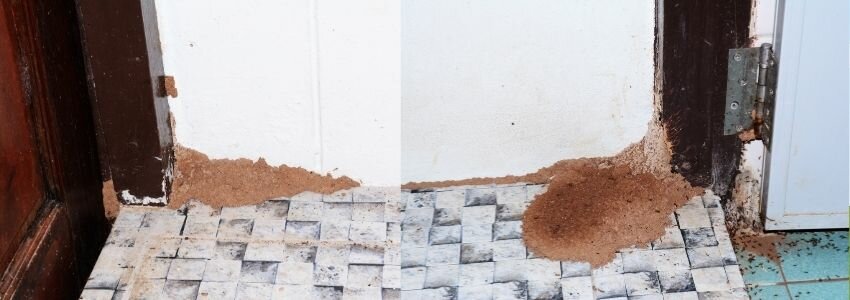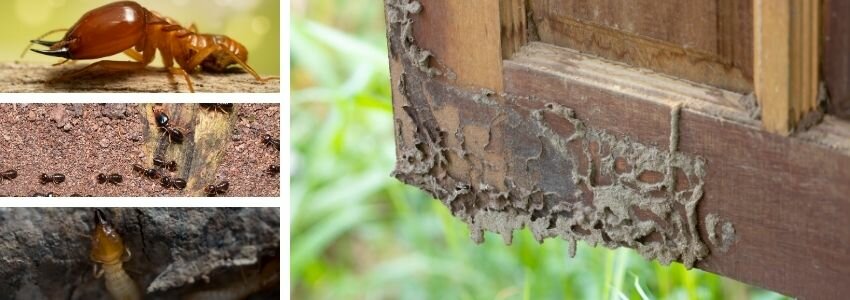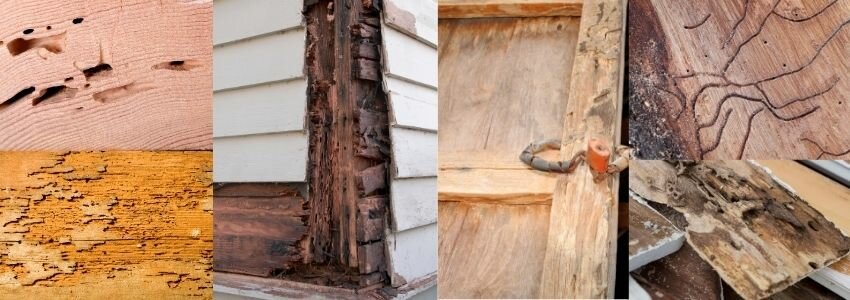Termites can be a major concern for homeowners, especially when it comes to selling a house. These small, wood-eating insects can cause significant damage to a home, and the presence of termites can make it more difficult to sell a property. In this article, we will explore the challenges of selling a house with termite damage and discuss some strategies for overcoming them.
We will also look at the importance of disclosing the presence of termites to potential buyers and the steps that can be taken to treat an infestation before putting the house on the market. Whether you are a homeowner looking to sell a house with termite damage or a buyer considering purchasing a property with termites, this article will provide valuable information and insights.
Could I have Termites in my Home?
The quick answer is most likely. If you live in the northeastern part of the state you’re in luck, termites are less likely to infest homes there. The Southern half of Utah is in Zone #2 for termites, this means the infestation probability is in the moderate to heavy zone with a potential for significant termite damage.
In general, homes that are located in warm, humid climates and have wood-to-soil contact are at higher risk for termite infestations. Homes that are older or have not been well-maintained may also be more vulnerable to termites.
According to the Utah Department of Agriculture and Food, termites are a significant problem in the state, with an estimated $30 million in damages occurring each year. While termites can be found in any part of the state, they are most commonly found in the warmer, southern regions.
What Types of Termites Thrive in my House?
In Utah you have the potential for two different types of termites to cause trouble. The first are subterranean termites. These pests build their colonies in the dirt and create underground pathways to underground wood structures, or wood on the ground surface. Wood above the soil isn’t safe as the termites make their way through their mud tubes to any wood above ground. These termites need a moist underground environment so they aren’t as common in our dry state. If they lack moisture the colony will die off.
Another type found in Utah is the drywood termites. This type of termite builds their nest in solid or non-decayed wood and doesn’t need contact with the soil. Drywood termites are most often found in attics, wood framing, doors and even furniture.
Signs you Might Have Termites
There are several signs that you may have termites in your house:
Swarms of flying insects:
During certain times of the year, termites may swarm in order to reproduce and establish new colonies. If you see a large number of small, winged insects inside or around your home, it could be a sign of a termite infestation.
Discarded wings:
After a termite swarm, you may find discarded wings around windowsills, doorways, or other areas of the house. These wings are left behind by termites as they shed them after mating.
Mud tubes:
Termites build mud tubes to protect themselves from predators and the elements as they travel between their nest and a food source. If you see small, tubular structures on the exterior of your house or on the foundation, it could be a sign of termites.
Damaged wood:
Termites eat wood from the inside out, so the damage they cause may not be immediately visible. If you see wood that looks hollow or appears to be crumbling, it could be a sign of termites.
Noise in the walls:
If you hear a clicking or rustling sound coming from your walls, it could be a sign of termites. Since termites swarm in large colonies you are actually able to hear a surprisingly loud chewing noise in your walls. The sounds have been mistaken for those of small rodents.
If you notice any of these signs, it is important to have a professional inspect your home to confirm the presence of termites and determine the extent of the infestation.
Diagnosing the Problem
If you have seen any of the signs above and you suspect you might have termites the best solution is to call a professional. There are home sprays and remedies for dealing with termites but a specialist can diagnose the extent of the problem and take steps to ensure you don’t end up with a reinfestation of the home wreckers.
Are Termites Harmful to My Health

Termites are a problem that should be addressed right away. The pesky insects will literally eat your house around you–including your wood furniture– if you don’t take action at the first sign of insects. If the damage isn’t extensive there is no problem with continuing to live in or sell your home with termite damage, but you’ll need to be on the lookout for a return of a swarm and to prepare against any future infestations. A pest inspector professional can give you an idea about the extent of the termite damage so you can bring in a contractor or other repair professionals.
Is there an instant fix to a termite problem?
There is no immediate, “instant” solution for getting rid of termites. Termites are persistent pests that can be difficult to eliminate, and it typically takes time and effort to effectively get rid of them.
If you are dealing with a termite infestation, the most effective way to get rid of the pests is to use a combination of chemical treatments and preventive measures. Chemical treatments, such as liquid termiticides and baits, can be applied to the soil around your home to kill termites and prevent them from returning. It is important to carefully follow the instructions for any chemical treatment and to use caution when handling the products.
How to Get Rid of Termites
Outside of hiring a professional pest control company there are some steps you can take to help defend against further termite problems.
- Keep your roof in top condition. Any broken or missing tiles can let in moisture, creating an opportunity for termites to move in.
- Check the wood around your house during the warm seasons. Simply testing the wood for strength and tapping on it (damaged wood will be brittle and hollow) is an easy way to stay ahead of the swarm.
- If you have a window unit for air conditioning keep an eye on any dripping moisture. Water dripping can create that moist wood environment that subterranean termites like so much.
- Watch how you store boxes, wood and even clothing piles. Termites love cardboard boxes so consider storing your items in plastic tubs instead. Stacks of firewood should be kept away from the side of the house and clothing piles should be maintained and stored properly.
- Watch for excess moisture build-ups around your home. Keep your drains sending water away from the house and fix any leaky pipes or sprinkler problems near your home.
- Keep a lookout for the suspicious sawdust piles inside and out, near wooden structures and furniture.
- Seal up your windows and doors. Termite swarms can get inside your house through a broken screen or a door that isn’t properly sealed.
What will happen if I don’t deal with the termites?
It is important to note that getting rid of termites can be a difficult and time-consuming process. It is generally best to seek the help of a professional to ensure that the infestation is completely eliminated and to prevent it from returning.
If you don’t deal with termites, they can continue to infest your home and cause significant damage. Termites are wood-eating insects that can eat through the structural wood in your home, causing damage that can be costly to repair. They can also compromise the integrity of your home’s structure, making it unsafe to live in.
In addition to the physical damage they can cause, termites can also be a financial burden. The cost of treating a termite infestation and repairing the damage they have caused can be significant. In some cases, the cost of repairs may exceed the value of the property, making it difficult to sell the home.
To protect your home and avoid the costs and headaches associated with termite damage, it is important to deal with termites as soon as you suspect their presence. This includes having a professional inspection to confirm the presence of termites and determine the extent of the infestation, and taking steps to eliminate the pests and prevent them from returning.
Can I Sell my Home with Termite Damage?
So you’re hoping to sell. Maybe you’ve just discovered the termites or you’ve had some damage that hasn’t been addressed yet. The question is, can you sell your home with termite damage? For starters, get a home inspection report, a qualified home inspector can lay out the severity of the problem for you. Be proactive and contact a contractor to get quotes on selling the house — it will most likely save you money in the long run to fix the damage yourself and list the home, problem-free. Selling a house with termite damage though scares off many potential buyers so spending the money upfront for proper termite diagnosis and repair could be worth if for you.
If you are selling a house with termites, it is important to be upfront and transparent about the issue. Disclose the presence of termites in the property disclosure statement and provide any relevant documentation, such as a termite inspection report. It is also a good idea to have the termites treated by a licensed pest control professional before putting the house on the market. This will show potential buyers that you have taken steps to address the issue and may make the property more attractive to them.
If the termite damage is more extensive it can cost thousands of dollars to repair the home. In scenarios like this it can be difficult to impossible to sell your home to a traditional buyer. Another option for selling your home with termite damage is to reach out to us, your local Utah house buying company. We will make you a cash offer and take care of the repair and costs, saving you the hassle.



Nice article! Thanks for sharing this informative post. Keep posting!
Thanks for sharing this useful information! Hope that you will continue with the kind of stuff you are doing.